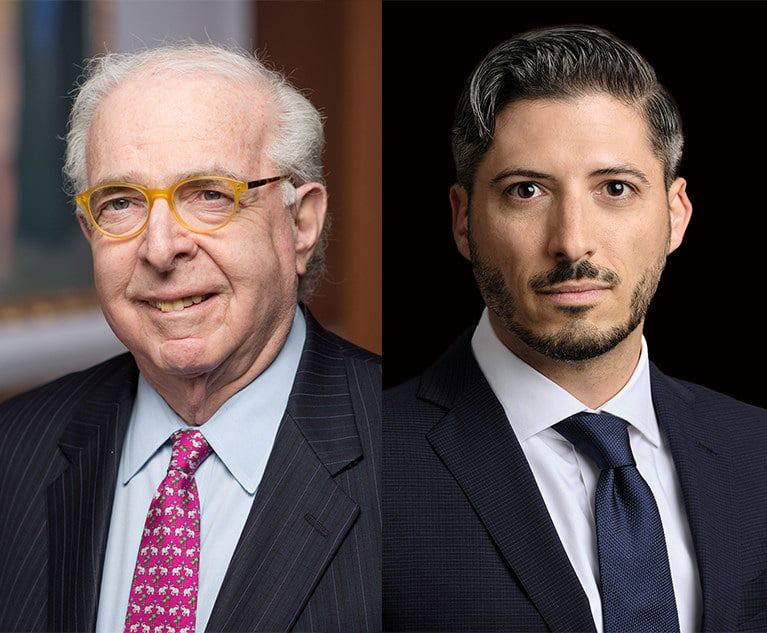Avoiding Pitfalls in Preparing a Mediation Term Sheet
If the term sheet contains all of the material terms of the parties' agreement and is expressly made enforceable in the absence of a more formal agreement, it should be sufficient to withstand collateral attack and end litigation over the underlying dispute.
March 18, 2022 at 02:30 PM
6 minute read
 If the parties can agree upon a settlement in mediation, it is essential that they put their agreement in writing, even if the mediation extends well into the night. Waiting until the next day can be dangerous since parties often change their minds about the deal after sleeping on it. The best way to memorialize the settlement is to prepare a formal settlement agreement as soon as a meeting of the minds has been reached. However, in most cases, because the parties are exhausted after many hours of mediation and many agreements, such as a patent license agreement, may contain detailed terms which need to be spelled out in a formal document, most parties and counsel are only willing to prepare a term sheet to memorialize their agreement. Term sheets present many potential pitfalls and these are some best practices to avoid them.
If the parties can agree upon a settlement in mediation, it is essential that they put their agreement in writing, even if the mediation extends well into the night. Waiting until the next day can be dangerous since parties often change their minds about the deal after sleeping on it. The best way to memorialize the settlement is to prepare a formal settlement agreement as soon as a meeting of the minds has been reached. However, in most cases, because the parties are exhausted after many hours of mediation and many agreements, such as a patent license agreement, may contain detailed terms which need to be spelled out in a formal document, most parties and counsel are only willing to prepare a term sheet to memorialize their agreement. Term sheets present many potential pitfalls and these are some best practices to avoid them.
The Parties Should Sign the Term Sheet. In most states where counsel have apparent authority to bind their clients to the provisions of a settlement agreement or term sheet, it is unwise for counsel to rely upon this apparent authority. Even after a term sheet has been signed by counsel, a client can seek to disown it and claim that it did not give counsel express authority to sign. The client may even retain new counsel to attack the deal, which may lead to litigation over the enforceability of the term sheet, including the prospects of a trial on whether the client consented to the settlement. The best way to avoid this potential problem is to have the parties themselves execute the term sheet. For any avoidance of doubt, the mediator could witness the signatures.
The Term Sheet Should Clearly Set Out the Persons and Entities Covered and the Scope of the Releases. Often term sheets simply recite that the parties will "exchange mutual releases" without specifying which parties (and any potential third parties) will be included in the releases and what the scope of the releases will be. For example, the releases may be general, including all claims between the parties even if they have not been asserted in the underlying litigation or arbitration or they may be limited to the issues raised in the pleadings. It is not advisable to defer these issues until a more detailed settlement agreement has been prepared. The persons and entities included in the releases and the substantive scope of the releases should be included in the term sheet.
This content has been archived. It is available through our partners, LexisNexis® and Bloomberg Law.
To view this content, please continue to their sites.
Not a Lexis Subscriber?
Subscribe Now
Not a Bloomberg Law Subscriber?
Subscribe Now
NOT FOR REPRINT
© 2025 ALM Global, LLC, All Rights Reserved. Request academic re-use from www.copyright.com. All other uses, submit a request to [email protected]. For more information visit Asset & Logo Licensing.
You Might Like
View All
Art of the Settlement: Trump Attorney Reveals Strategy in ABC Lawsuit

Evolving Legal Standards to Combat Disqualification of Arbitrators for Failing to Disclose Conflicts of Interest
8 minute read
Court of Appeals Holds that Arbitration Agreements Can Be Formed Through ‘Clickwrap’ Process
8 minute read
Trending Stories
- 1TikTok Law and TikTok Politics
- 2California Supreme Court Vacates Murder Conviction in Infant Abuse Case
- 3New York’s Proposed Legislation Restraining Transfer of Real Property
- 4Withers Hires Lawyers, Staff From LA Trusts and Estates Boutique
- 5To Speed Criminal Discovery, NY Bill Proposes Police-to-Prosecutor Pipeline For Records
Who Got The Work
Michael G. Bongiorno, Andrew Scott Dulberg and Elizabeth E. Driscoll from Wilmer Cutler Pickering Hale and Dorr have stepped in to represent Symbotic Inc., an A.I.-enabled technology platform that focuses on increasing supply chain efficiency, and other defendants in a pending shareholder derivative lawsuit. The case, filed Oct. 2 in Massachusetts District Court by the Brown Law Firm on behalf of Stephen Austen, accuses certain officers and directors of misleading investors in regard to Symbotic's potential for margin growth by failing to disclose that the company was not equipped to timely deploy its systems or manage expenses through project delays. The case, assigned to U.S. District Judge Nathaniel M. Gorton, is 1:24-cv-12522, Austen v. Cohen et al.
Who Got The Work
Edmund Polubinski and Marie Killmond of Davis Polk & Wardwell have entered appearances for data platform software development company MongoDB and other defendants in a pending shareholder derivative lawsuit. The action, filed Oct. 7 in New York Southern District Court by the Brown Law Firm, accuses the company's directors and/or officers of falsely expressing confidence in the company’s restructuring of its sales incentive plan and downplaying the severity of decreases in its upfront commitments. The case is 1:24-cv-07594, Roy v. Ittycheria et al.
Who Got The Work
Amy O. Bruchs and Kurt F. Ellison of Michael Best & Friedrich have entered appearances for Epic Systems Corp. in a pending employment discrimination lawsuit. The suit was filed Sept. 7 in Wisconsin Western District Court by Levine Eisberner LLC and Siri & Glimstad on behalf of a project manager who claims that he was wrongfully terminated after applying for a religious exemption to the defendant's COVID-19 vaccine mandate. The case, assigned to U.S. Magistrate Judge Anita Marie Boor, is 3:24-cv-00630, Secker, Nathan v. Epic Systems Corporation.
Who Got The Work
David X. Sullivan, Thomas J. Finn and Gregory A. Hall from McCarter & English have entered appearances for Sunrun Installation Services in a pending civil rights lawsuit. The complaint was filed Sept. 4 in Connecticut District Court by attorney Robert M. Berke on behalf of former employee George Edward Steins, who was arrested and charged with employing an unregistered home improvement salesperson. The complaint alleges that had Sunrun informed the Connecticut Department of Consumer Protection that the plaintiff's employment had ended in 2017 and that he no longer held Sunrun's home improvement contractor license, he would not have been hit with charges, which were dismissed in May 2024. The case, assigned to U.S. District Judge Jeffrey A. Meyer, is 3:24-cv-01423, Steins v. Sunrun, Inc. et al.
Who Got The Work
Greenberg Traurig shareholder Joshua L. Raskin has entered an appearance for boohoo.com UK Ltd. in a pending patent infringement lawsuit. The suit, filed Sept. 3 in Texas Eastern District Court by Rozier Hardt McDonough on behalf of Alto Dynamics, asserts five patents related to an online shopping platform. The case, assigned to U.S. District Judge Rodney Gilstrap, is 2:24-cv-00719, Alto Dynamics, LLC v. boohoo.com UK Limited.
Featured Firms
Law Offices of Gary Martin Hays & Associates, P.C.
(470) 294-1674
Law Offices of Mark E. Salomone
(857) 444-6468
Smith & Hassler
(713) 739-1250






